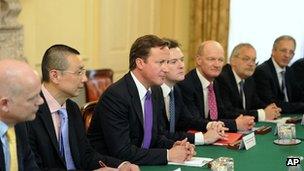UK trade deficit at 15-year high
- Published

The UK's trade gap widened sharply in June, to its worst level since comparable records began in 1997.
The deficit, which measures how much imported goods and services exceed exports, rose to £4.3bn in June from £2.7bn in May.
The rise was driven by a 4.6% month-on-month fall in the value of UK exports to eurozone and non-European Union countries.
The deficit with non-EU nations rose to £5.2bn in June from £3.9bn in May.
Economists and analysts greeted the figures with dismay.
BNP Paribas analyst David Tinsley said that even allowing for the reduced number of working days in June - because of the extra bank holiday from the Diamond Jubilee celebrations - the numbers were "very weak".
"There's clearly been a big impact from the low number of working days which has directly affecting shipments," said Mr Tinsley.
He added that the main disappointment was the deficit in services, and within that, partly in financial services.
Vicky Redwood, analyst at Capital Economics, called the data "awful", but said that the extra days off work could not be blamed for the growing deficit.
"If the bank holiday halted work at ports, it should have affected both imports and exports. And previous extra bank holidays have not had that big an impact on the overall deficit," said Ms Redwood.
Exports to non-EU countries fell 9.6% to £11.9bn, according to figures from the Office for National Statistics.
At the same time, imports to Britain from non-EU countries were unchanged between May and June, at £17.1bn.
The fall in total exports of goods was driven by lower trade in oil, especially to the US, by chemicals to all non-EU countries, and by car production and shipping to places such as China.
"It is disappointing to see such a large trade deficit in June," said David Kern, chief economist at the British Chambers of Commerce (BCC).
"Although the monthly figures would have been affected by public holidays, such as the Diamond Jubilee, it is worrying that the trade deficit in the second quarter as a whole was much higher than in the first.
"There is no question that British exporters are facing major challenges as a result of problems in the eurozone, but the rebalancing of the UK economy towards exports is taking too long."
The Bank of England's latest quarterly inflation report, issued on Wednesday, forecast that the UK economy would barely grow at all in 2012.
The Bank cut its growth and inflation projections for the year.